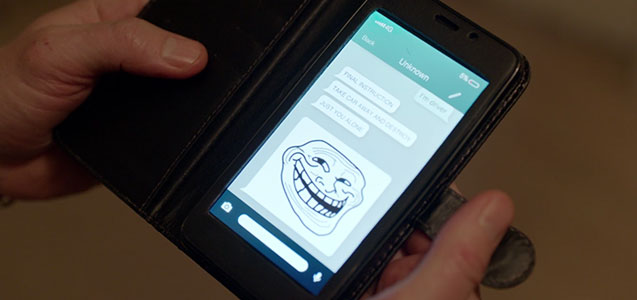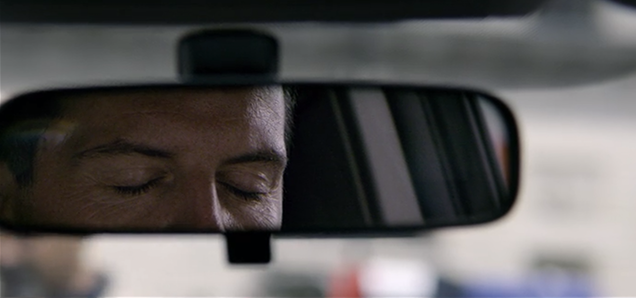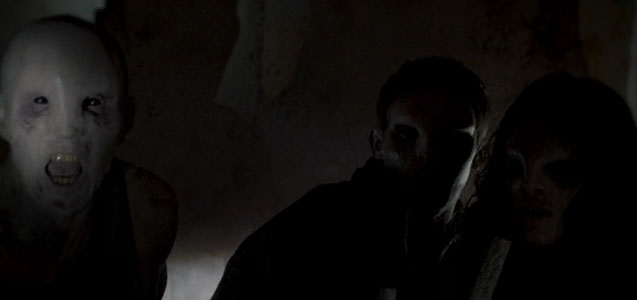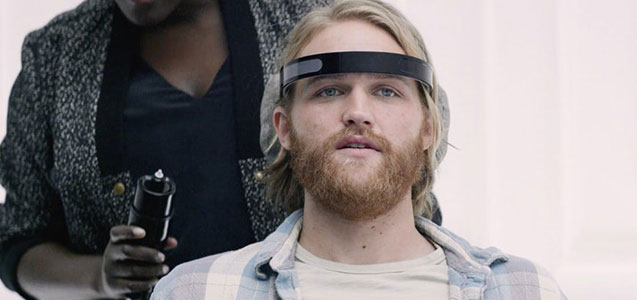Every Episode of Black Mirror, Ranked
Inside Black Mirror
Inside Black Mirror
By Charlie Brooker , Annabel Jones , Jason Arnopp
In Stock Online
Hardcover $30.00
For five seasons now, Black Mirror has taken the vaunted science fiction anthology format to new levels, building on everything that’s come before with a series of genre-defying mini-movies. Typically, the show will introduce a bit of tech that’s just that side of plausible, and take it to its darkest extreme. Beyond that, though, there’s no set style: the stories can be funny, tragic, sad, cynical, nasty, or deeply human. The very best are all of those things.
For five seasons now, Black Mirror has taken the vaunted science fiction anthology format to new levels, building on everything that’s come before with a series of genre-defying mini-movies. Typically, the show will introduce a bit of tech that’s just that side of plausible, and take it to its darkest extreme. Beyond that, though, there’s no set style: the stories can be funny, tragic, sad, cynical, nasty, or deeply human. The very best are all of those things.
Any discussion of the best and the worst of the series will largely depend on your own sensibilities. Nevertheless, we present our 100 percent definitive, absolutely uncontroversial ranking of the best and worst of Black Mirror. If you take issue with where your favorite falls on the list, just remember: monkey loves you.

23. “Shut Up and Dance”
Hackers take over a teen’s computer and threaten to expose his solo sexual activities to the world if he doesn’t commit a series of increasingly intense tasks. Commentary on the “for the LULZ” troll culture aside, its an episode that falls victim to the show’s worst impulses: much as in season two’s “White Bear,” the big twist undermines the whole thing, attempting to convince us maybe the kid had it coming all along—after we’ve been lead to care about him. The performances are spot on, and the story’s engaging enough for a time, but the vague moral (“people who are bad deserve absurdly elaborate punishments, or do they?”) is just lazy. This is Black Mirror at its most mean-spirited. (Season 3, Episode 3)

22. “Crocodile”
With points for style, this stands as one of Black Mirror’s darkest episodes, if that’s your thing. Andrea Riseborough’s Mia spends years hiding the facts behind an accident in which a cyclist was killed, and then when the truth threatens to come to light, she squashes it back down with an increasingly preposterous string of murders. The coverup is definitely worse than the crime, and it all begins to feel a little silly by the end, despite a sympathetic secondary character who unwittingly uncovers dark secrets while investigating a totally different accident using a memory recall device. A technological angle that feels arbitrary, an ironic twist to the final murder that falls flat, and a telltale guinea pig all contribute to the muddle. (Season 4, Episode 3)

21. “Black Museum”
What would be a perfectly fine episode of a lesser horror anthology show fizzles as an episode of Black Mirror, in that the two of the three stories presented by museum proprietor Rolo Haynes are chilling little horror vignettes, but not much else (they feel like episode ideas that were rejected for being too thin)—the middle segment, in which a couple goes from love, to hate, to stuffed monkey, is particularly ill-conceived. The final segment, which involves a black woman taking revenge against a system that has treated her family as less than human, is really the only part that works, but would be better served as the focus of its own episode. Each segment involves some sort of altered perspective, and, by the end, we’re perhaps meant to reflect on our relationship with a show in which we watch bad things happen to people over and over again. But season one’s “The National Anthem” did that theme better. Bonus points for fun callbacks to previous episodes in the museum, and for the increasingly less subtle suggestion that all of this is happening in the same universe, but it all feels underdone, and the folksily macabre narration from Haynes (complete with innuendo the Cryptkeeper would reject as too one-the-nose) almost kills it in the cradle (er, no pun intended). (Season 4, Episode 6)

20. “White Bear”
A woman wakes up with amnesia to find that everyone she meets seems to be filming her, even as she’s being chased by hunters in black masks. For a while, it’s effectively creepy, and works well as a zombie-apocalypse nightmare movie, but the big reveal (one of the show’s silliest) comes a bit too early, and pulls down the rest of the episode. A muddled moral that mixes ideas about voyeur culture and our treatment of criminals doesn’t help. (Season 2, Episode 2)

19. “Arkangel”
Marie outfits her daughter Sara with tracking software that allows her to see everything the kid does, as well as block out stressful images (so, most of Black Mirror). After stopping for a time (apparently realizing what a terrible idea it is), when Sara becomes a teenager, Marie starts using the software again and… doesn’t like what she sees. It’s a neat premise, with critiques of modern styles of helicopter parenting, but it all feels rather by-the-numbers. The episode introduces a technology that sounds like a really bad idea, and it is. Not much suspense there, and it quickly discards the most interesting question: what would happen to someone who grew up totally sheltered from the worst of society were suddenly thrust into the worst of modern culture? (Season 4, Episode 2)

18. “Smithereens”
Black Mirror was overdue for an episode about the existential terror of ride sharing, but this was maybe not the way to do it. Hitcher rideshare driver Chris has been stalking the employees of social media juggernaut Smithereen, hoping to kidnap someone important enough to the company to get him an audience with its Jack Dorsey-esque CEO. Unfortunately, he mistakes the well-dressed intern he picks up for someone actually important, bungling the extortion attempt before it begins and leading to a long standoff with the local police who have the car surrounded. There are a few nice bits of business illustrating how a lack of legal red tape makes social media companies much more effective than the police at profiling the suspect, but the hostage situation goes on long after the point has been made. Ultimately, we learn that Chris’ own distracted driving killed his fiancée, and he just wants to publicly own his guilt in a way that might actually get some attention. It’s meant to be about the real dangers of online addiction, but plays more as a story sympathetic to a white man who terrorizes others because he’s unable to process his own guilt. The same message would’ve been more effective in were the episode not so wildly overlong, but is almost redeemed by some truly stellar performances, including Topher Grace, deliciously well-cast as Smithereen’s semi-obnoxious CEO. In a sense, the only episode this season not involving any non-extant tech seems to have taken the “What if phones, but too much?” internet meme a bit too seriously. (Season 5, Episode 2)

17. “Metalhead”
More like Black-and-White Mirror, amirite? …because it’s done in black and white. Ahem. There’s no big reveal in this episode, and not much of a technological twist as we’ve come to expect from this show. Nevertheless, it’s a wonderfully effective chase through a barren landscape, as a woman flees from a lethal drone that looks like a cross between a dog and a cockroach, using its minimalist aesthetic as a virtue. The episode is intellectually unambitious, but Maxine Peake wrings every bit of emotion out of her (almost) one-woman show. It’s well-directed, and those dog things are legit scary, with s twist at the end more poignant than shocking. (Season 4, Episode 5)

16. “Men Against Fire”
A soldier with augmented reality implants is part of a team tasked with rooting out “roaches,” a sub-human offshoot of mankind that must be wiped out to preserve the gene pool. Naturally, nothing is what it appears to be, and there’s more (or less?) to the roaches than it seems. There are some solid ideas about the dehumanizing aspects of high-tech warfare, and about how little we’ll hang a genocide on, but none of the ideas are particularly new, and you can see the trademark big reveal coming a mile off. (Season 3, Episode 5)

15. “Playtest”
This one could only be considered straightforward by the standards of this show, but the story of a traveller’s journey into his darkest fears amounts to a particularly terrifying (and visually striking) haunted house story. Wyatt Russell’s Cooper agrees to be part of an elaborate augmented reality game in which his darkest fears are harvested for play value. He reveals unexpected depths as his surfer-boy exterior is slowly broken down over the course of the hour, which takes the story of an immersive horror video game to another level via undertones of family trauma. Unfortunately, a clever but unnecessarily bleak ending makes everything that came before feel a little pointless. (Season 3, Episode 2)

14. “White Christmas”
It’s Christmastime on a very special Black Mirror. This anthology-within-an-anthology episode (which is, at least, far more successful than “Black Museum”) features Jon Hamm as Matt, a pervy dating coach who also works as a rep for a company with a particularly nasty means of running your smart home. Rafe Spall plays Ben, who works with Matt at the mysterious outpost in the wilderness, and who had a not-great reaction to his wife’s pregnancy. It’s all a bit nasty, but given that it’s a Christmas special, that’s probably the point. The three stories come together by the end in a particularly impressive feat of knot untangling that hits upon most of Black Mirror’s pet themes. (2014 Holiday Special)

13. “Hated in the Nation”
The show went from mini-movie to full-length feature with this, the double-length third season finale. The episode takes some of the ideas we’ve seen before—the dangers of social media to drive us to make instant judgments—and takes them to a new level in a procedural story about a killer hashtag, as social media users vote on who deserves to die in a given week. Doesn’t sound all that far-fetched, really, in an age in which online shaming is so swift and all-encompassing. The more traditional cop/murder mystery elements work just fine, even if some of it does feel like padding. (Season 3, Episode 6)

12. “Rachel, Jack and Ashley Too”
Can Black Mirror be…fun? Almost! Miley Cyrus is great as a pop star cruelly manipulated by her aunt/manager. While most episodes of the show save their darkest twists for the end, here all the bad stuff goes down before the final act, and the episode ends on a rare high note following a car chase involving Cyrus, her rescuers, and a fowl-mouthed animatronic doppelgänger. Unfortunately, the episode seems to have no idea what to do with the sisters who should be the heart of the story—we’re introduced to them and their family trauma as central elements, but they end up as supporting characters in the story of the pop star, and we’re given a weird mixed message about the virtues of cynical celebrity merch. Nitpicking aside, it’s a fun romp, with a final act satisfying to bump it up the list a few spots. (Season 5, Episode 3)

11. “The Entire History of You”
The episode, in which the “grain” behind your ear records everything you see and hear with perfect fidelity, is a brilliant ode to the virtues of imperfect memory and selective recall in a world in which we’re increasingly recording our every move for posterity. The performances are great—including the one from soon-to-be The Doctor, Jodie Whittaker—but it loses points for featuring such a wildly unsympathetic protagonist in Toby Kebbell’s Liam. What could have been a cautionary tale with universal relevance ends up feeling like deserved comeuppance for a hyper-jealous jerk. (Season 1, Episode 3)

10. “Hang the DJ”
Man, these kids and their Tinders and their Grindrs and their whatnots. Once again, we’re introduced to a more extreme version of modern technology and are primed to try to figure out why it’s bad for us (as Mallory Ortberg famously said, “What if phones but too much?”). Except that it’s maybe not in this one, which might be the biggest twist of all. “The System” takes care of (and dramatically enforces) every aspect of dating: who to meet, where, when, and for how long. Even what to eat on your date. A couple gradually comes to decide that they want to be together, no matter the cost, and The System be damned. Black Mirror at its most charming, which means you only spend about half the episode worried about those ominous creeps in the background. (Season 4, Episode 4)

9. “USS Callister“
There are several targets in this Star Trek parody/homage, including creaky old science fiction tropes, but the most pertinent is the toxicity of fan culture. Jesse Plemons (doing a quite brilliant Shatner) plays a tech genius with no social skills who creates a virtual fan-fiction universe in which he’s in charge, offering up platitudes about bettering mankind as captain of his ship, even though he’s more interested in acting out every ugly, misogynistic impulse kept in check in the real world. When his virtual crew, lead by Crisin Miloti, rebels, it’s as tense and thrilling as it is glorious. The best episode of an uneven season 4, despite an ending that might be one “gotcha!” too many. (Season 4, Episode 1)

8. “The National Anthem”
“WTF?” is the only sensible response to exposure to the show’s very first episode. A lesser program would have played the plot—about a politician forced into an unthinkable act with a pig—as satire, with cartoon politicians and a slavering public. Instead, Brooker plays it straight, and is bold enough to consider the real emotions surrounding an absurd situation, which calls everything about our modern style of politics into question. But even that’s too easy a target: even more so, this is about our appetite for spectacle, up to and including watching a show about a man fornicating with a pig. Who thought to air this bit of insanity first? Brilliant. (Season 1, Episode 1)

7. “Fifteen Million Merits”
The metaphor isn’t very complicated: Daniel Kaluuya’s Bing rides an energy-generating stationary bike in exchange for “merits” that can be spent on, typically, virtual crap. He decides to give it all up in order to help a friend make a name for herself as a reality show singing star. It does not go as he expects, and his attempts to literally and figuratively get off that stationary bike end with him becoming a tool of the system he hated. A particularly cynical ending, but well-earned by Kaluuya’s powerhouse performance. (Season 1, Episode 2)

6. “Be Right Back”
The Black Mirror ethos: introduce a piece of plausible near-future tech, and explore the ramifications. Typically they’re horrific, but occasionally, the show paints a more nuanced picture. This second season episode is a ghost story in which Domhnall Gleason’s Ash is killed and replaced with a virtual replica created out of social media posts and old emails. How much of our online presence is a true reflection of us? And is any of this virtual nonsense a fit replacement for genuine human interaction? Maybe. The ambiguously happy ending is one of the show’s best, and suits the poignant story perfectly. (Season 2, Episode 1)

5. “Nosedive”
A rom-com, Black Mirror-style. The ideas here aren’t particularly new, even for this show, but there’s a clarity of purpose here that makes a strong statement about our addiction to Likes. Bryce Dallas Howard gives a brilliant and frequently hilarious performance as the generally harmless but incredibly fake Lacie, obsessed with upping her social media ranking. As suggested by the title, it all goes downhill quickly, but avoids notions of a Facebook apocalypse by suggesting a way out. It all leads to a hard-earned, profanity-laden happy-ish ending. (Season 3, Episode 1)

4. “The Waldo Moment”
What starts out as a not-terribly-convincing parody of Daily Show-esque political comedy shows turns into one of Black Mirror’s most effective and timely critiques. Sincerity is dead, and populist nihilism, represented here by a randy blue bear and his puppeteer Jamie, is the default political mode of our day. The criticisms leveled by Waldo/Jamie at greedy politicians are on point, but even Jamie comes to realize that riling people up against what they don’t like isn’t a substitute for compassion and thoughtfulness. An unnecessarily on-the-nose coda doesn’t spoil an effective episode that, if anything, hits a bit too close to home (this one came out in 2013, when it all might have seemed a bit more sci-fi than it does in 2019). (Season 2, Episode 3)

3. “Striking Vipers”
With a nuanced take on the pressures of marriage and the evolution of relationships over time, this one skips over easy answers but ends on a hard-won note of insight. The story’s central love triangle could have easily been silly—especially given the Street Fighter-esque virtual reality game that initially causes ripples in first a friendship, then a marriage—but the performances and writing are all impressively grounded. The unexpected conclusion suggests that a lot of communication and a healthy, open-minded approach to sex and sexuality can stave off an awful lot of hurt. Black Mirror at its most human, and humane. (Season 5, Episode 1)

2. “San Junipero”
Twist endings can be a trap. With a show like The Twilight Zone (Black Mirror’s clearest inspiration), it’s often the last-minute reveal that we remember, the rest of the story fading into insignificance given a surprise that undermines everything we’ve seen. At its best, an episode of Black Mirror reveals itself in ways that don’t make what came before irrelevant, but shed new light on what we’ve seen. The show wastes no time teasing that the ’80s-era wonderland of San Junipero isn’t a normal place, and you might guess why well before the end. It doesn’t matter: it’s all in service of a love story that’s tragic and sweet, clever and unexpectedly joyous. No tricks, just good storytelling. (Season 3, Episode 4)

1. “Bandersnatch”
Even if this 2018 holiday surprise—the only new episode that dropped in 2018—wasn’t an unprecedented achievement in narrative entertainment (more on that in a second), this would still be a great installment of Black Mirror… or a few of them, actually. A “Choose Your Own Adventure”-inspired mind-bender, it follows a troubled young video game developer in the mid-1980s as he attempts to create an immersive interactive experience and finds his meta-narrative breaking through into his own reality. Any of it’s myriad endings would suffice as a satisfying “gotcha” in their own right (we’re particular fans of the one in which the young man discovers he’s being manipulated by viewers of… Netflix?), but that they are all the product of your own choices—via periodic selections you make with your remote—makes their impact all the greater (more than once, we felt genuinely guiltly for the madness we helped unfold onscreen). Impressive technological achievements aside—Netflix reportedly developed an entirely new system to handle the complexity of the branching narratives—this is a story rich in all the themes Black Mirror loves best: technology, obsession, and the illusion of control. It’s hard to see how they’re going to top it. (2018 special)
What’s your favorite Black Mirror?
